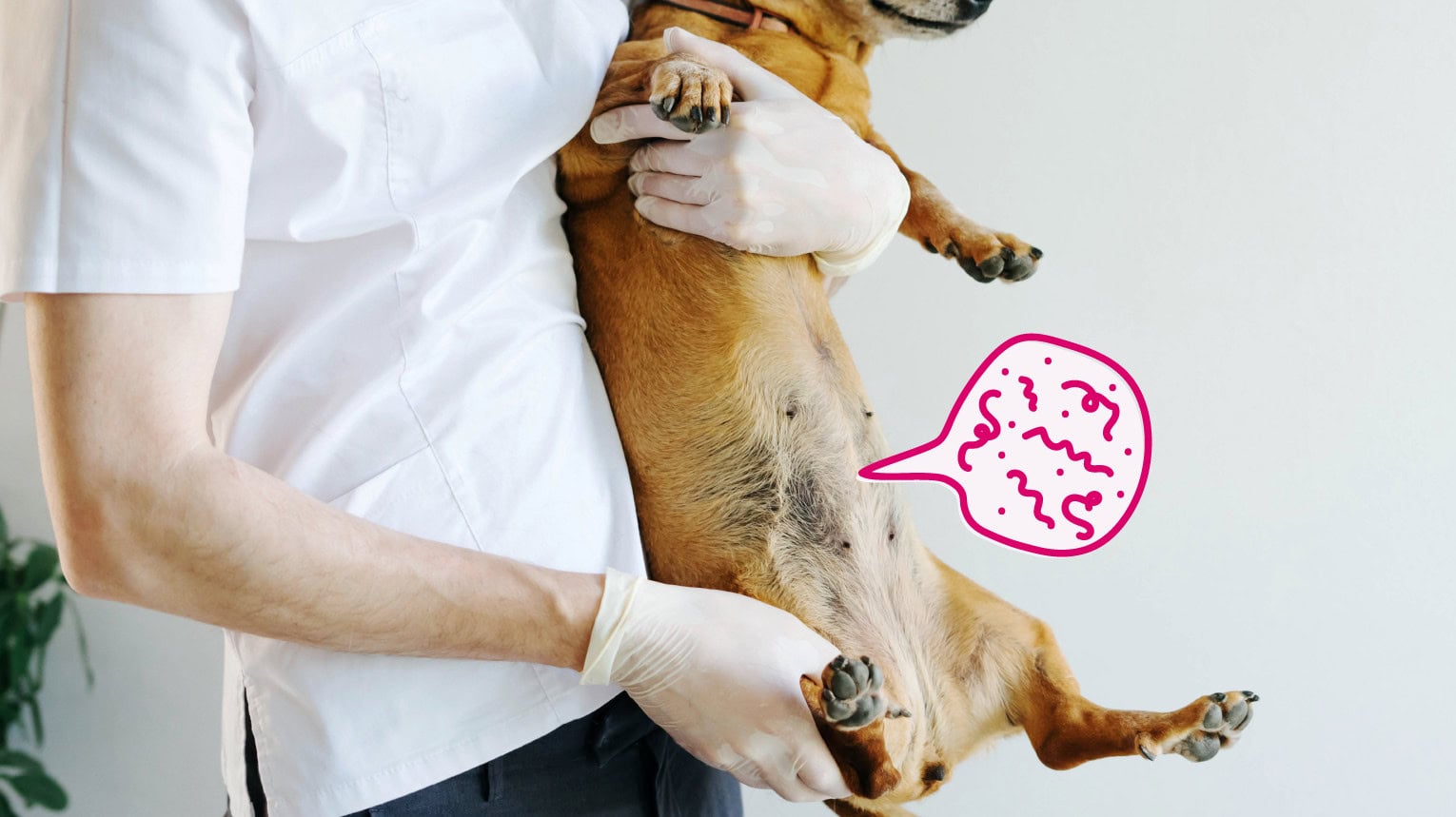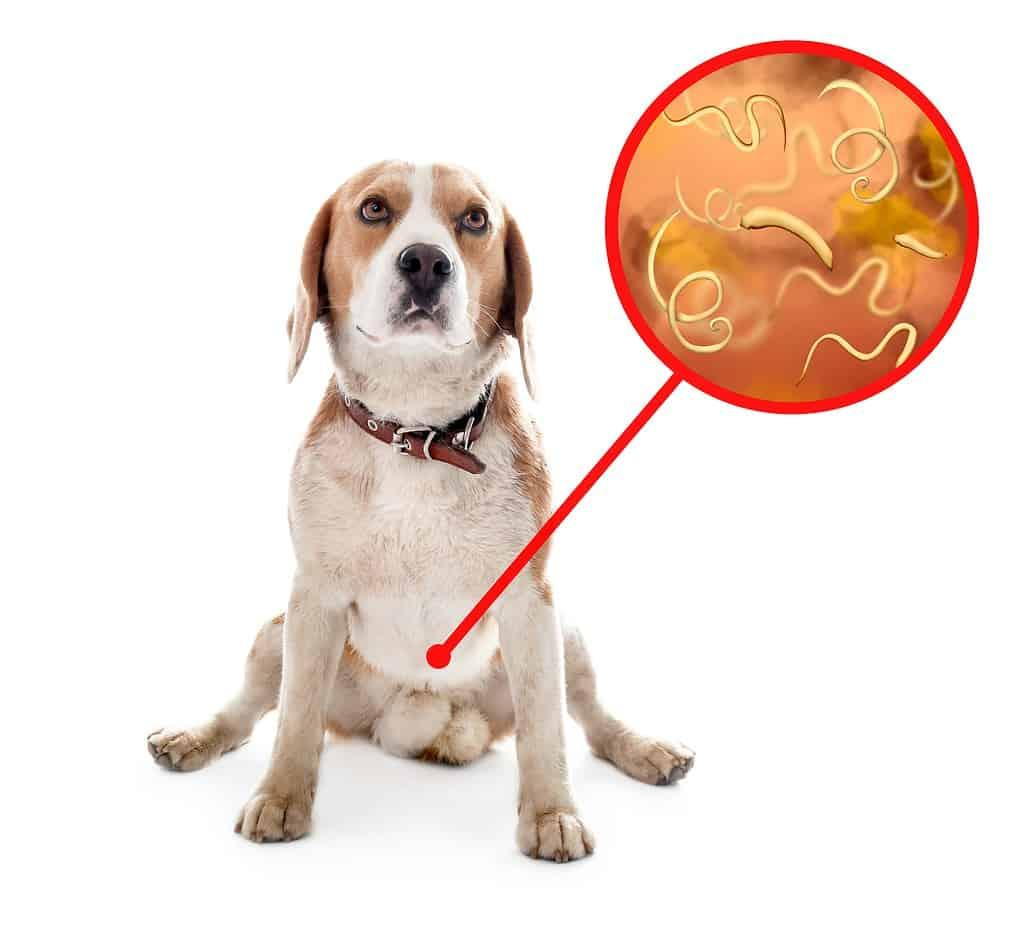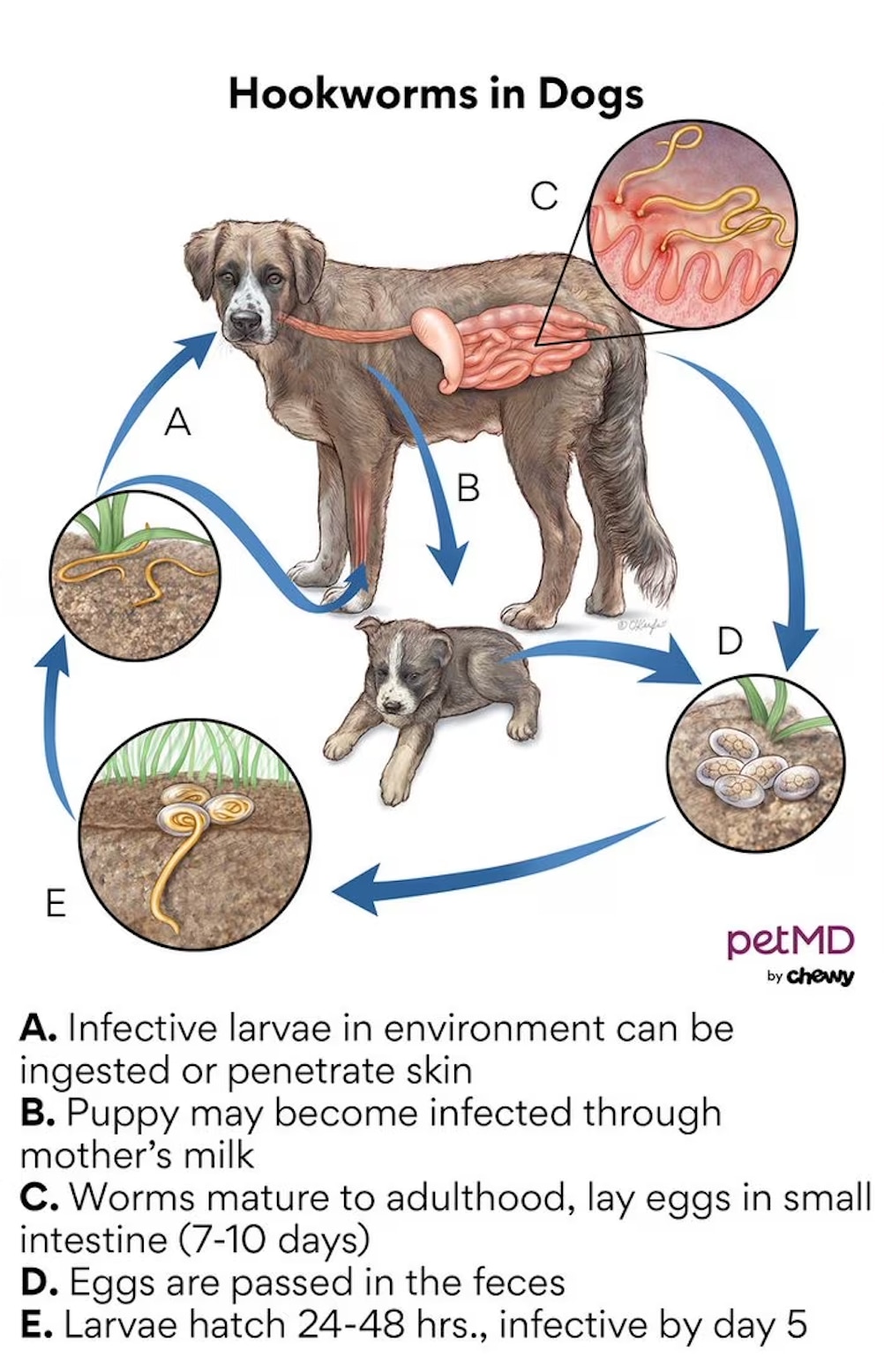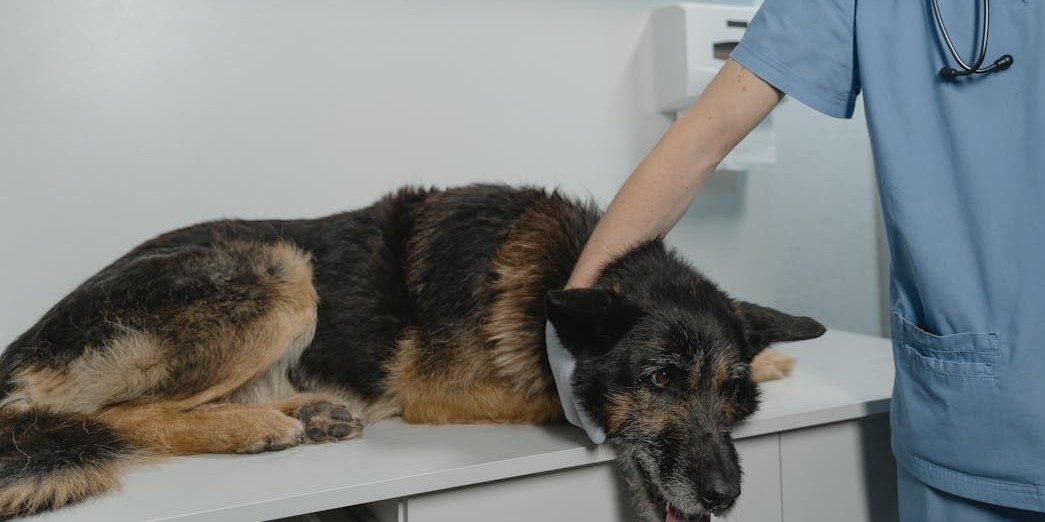Is your furry friend acting a little off? You might be surprised to learn that one common culprit could be worms.
Dog worms symptoms can range from subtle changes in behavior to more noticeable physical signs. If you’ve ever wondered what to look for, you’re in the right place. Understanding these symptoms is crucial for your dog’s health and well-being. By recognizing the signs early, you can take action to protect your pet from potential health issues.
You’ll discover the key symptoms to watch for and why they matter. Don’t wait until it’s too late—your dog relies on you to keep them happy and healthy. Keep reading to ensure your beloved companion stays worm-free and thriving!

Credit: thevets.com
Common Symptoms Of Dog Worms
Recognizing dog worms symptoms is essential for your pet’s health. Worms can cause serious problems if left untreated. Early detection can lead to effective treatment. Here are the most common symptoms to watch for.
Visible Worms In Feces
One of the most obvious signs is finding worms in your dog’s stool. You might see small, white, or rice-like segments. These indicate the presence of tapeworms. Roundworms can look like spaghetti. Always check your dog’s poop regularly.
Vomiting
Frequent vomiting can signal a worm infestation. You may notice worms in the vomit. This is especially common with roundworms. If your dog vomits repeatedly, consult your vet.
Diarrhea
Diarrhea, especially with blood, can indicate worms. Loose stools may occur more often than normal. This can lead to dehydration if not treated. Monitor your dog’s bathroom habits closely.
Weight Loss
Unexpected weight loss is another symptom. Worms consume nutrients meant for your dog. Despite eating normally, your dog may still lose weight. Regularly check your dog’s weight for changes.
Increased Appetite
Some dogs may eat more but still lose weight. This happens because worms steal nutrients. If your dog seems hungry all the time, it could be a sign. Keep an eye on their eating habits.
Bloated Stomach
A bloated or swollen belly can occur with severe infestations. This is especially common with roundworms. If your dog’s belly looks swollen, seek veterinary help.
Weakness And Lethargy
Worms can make your dog feel weak and tired. You may notice decreased energy levels. Your dog might not want to play as usual. Watch for changes in their behavior.
Scratching Or Rubbing Rear
Dogs may scratch or rub their rear on the ground. This can indicate irritation from worms. Check for visible worms around their rear end. Keep your pet’s hygiene in mind.

Credit: www.morganpetclinic.com
Types Of Worms Affecting Dogs
Worms can cause serious health issues in dogs. They often go unnoticed until symptoms appear. Understanding the different types of worms is key for prevention and treatment. Here are the most common types of worms that affect dogs.
Roundworms
Roundworms are one of the most common intestinal worms in dogs. These worms are long and spaghetti-like. They can be especially harmful to puppies. Infected dogs may show signs like a bloated belly and weight loss.
Tapeworms
Tapeworms are flat and segmented. Dogs usually get these worms from fleas. Infected dogs may have visible segments in their feces. Symptoms include itching around the rear and weight loss.
Hookworms
Hookworms are small but dangerous. They attach to the intestinal wall and feed on blood. This can lead to anemia and weakness. Infected dogs may show signs like pale gums and lethargy.
Whipworms
Whipworms are less common but still harmful. They live in the large intestine. Symptoms include diarrhea, weight loss, and dehydration. Whipworms can be tricky to detect without a vet’s help.
Heartworms
Heartworms are different from intestinal worms. They live in the heart and lungs. Mosquitoes spread these worms through bites. Symptoms include coughing, fatigue, and difficulty breathing. Heartworms can be fatal if not treated.
Recognizing these types of worms is crucial. Regular vet check-ups help catch infections early. Keep your dog healthy and happy by staying informed.
Visible Signs In Stool And Vomit
Detecting dog worms can be challenging. Observing your dog’s stool and vomit is crucial. Changes in these areas often signal health issues. Look for unusual signs. They can indicate the presence of worms.
Signs In Stool
Dog stool can reveal a lot about their health. Check for any unusual shapes or colors. Worms may cause the stool to appear loose or watery. You might notice blood or mucus in the stool.
Sometimes, you may see worms or eggs in the feces. Roundworms often look like spaghetti. Tapeworm segments may look like grains of rice. These visible signs are alarming and need attention.
Signs In Vomit
Vomit can also show signs of worms. If your dog vomits, inspect it carefully. You might find worms in the vomit. This is especially true for roundworms.
Other unusual contents may appear in the vomit as well. Look for changes in color or consistency. Frequent vomiting may indicate a serious issue. Always consult a vet if you see these symptoms.
Behavioral Changes To Notice
Noticing behavioral changes in your dog can be one of the first signs that something is wrong. If your furry friend is acting differently, it may indicate the presence of worms. Understanding these behavioral shifts can help you take timely action.
Increased Lethargy
Has your dog become less energetic? Increased lethargy is a common symptom of worms. You might find your dog sleeping more or refusing to play.
For instance, my dog Bella used to chase after squirrels in the park. One day, she just lay on the grass, uninterested in her favorite game. It turned out she had intestinal worms.
Changes In Appetite
Take note if your dog suddenly has an increased or decreased appetite. Worms can cause constant hunger or lead to weight loss despite eating well.
When I noticed my dog, Max, begging for food more than usual, I thought he was just being greedy. After a vet visit, we discovered he had roundworms, which were preventing him from absorbing nutrients.
Unusual Bathroom Habits
Changes in your dog’s bathroom habits can be alarming. Watch for signs of diarrhea, especially if it contains blood, or if your dog is straining to poop.
A friend of mine faced this issue with her dog, who had frequent, watery stools. After a simple vet check-up, they found out he had hookworms. Quick action made all the difference!
Increased Scratching Or Rubbing
If you notice your dog scratching more often, especially around the rear end, it could be a sign of worms. This behavior might stem from irritation caused by parasites.
Have you ever seen your dog drag its rear on the grass? It’s not just a funny sight; it can indicate the presence of worms. Pay attention to these signs to ensure your dog’s comfort.
Behavioral Withdrawal
Is your normally social dog becoming withdrawn? Behavioral changes, such as hiding or avoiding interaction, can indicate discomfort from worms.
I once had a puppy who loved to play with the kids. Suddenly, she started isolating herself. After a vet visit, we learned she had a severe case of tapeworms, affecting her mood.
Being aware of these behavioral changes can help you act quickly. If you notice any of these signs, don’t hesitate to consult your veterinarian. Your dog’s health and happiness depend on it!
Physical Indicators Of Worm Infestations
Worm infestations in dogs can cause various physical symptoms. Early detection is vital for effective treatment. Observing your dog’s behavior and appearance is essential. Here are some key physical indicators to watch for.
Visible Worms In Feces
One of the most obvious signs is finding worms in your dog’s stool. These worms may look like small pieces of spaghetti or grains of rice. Regularly check your dog’s feces during walks. This simple check can help you spot a problem early.
Weight Loss Despite Good Appetite
Unexpected weight loss can indicate a worm infestation. Your dog may eat normally but still lose weight. Worms consume nutrients that your dog needs. This leads to malnutrition and weight loss.
Abdominal Swelling
A bloated stomach is another sign of worms. This swelling can make your dog appear distended. A bloated belly often occurs with other symptoms. Always monitor your dog’s abdomen for changes.
Vomiting And Diarrhea
Frequent vomiting or diarrhea may occur with worm infestations. This can happen with or without blood. Keep an eye on your dog’s bathroom habits. Changes in stool consistency can be an important indicator.
Scratching Or Rubbing Of The Rear
Your dog may scratch or rub its rear excessively. This behavior may indicate irritation from worms. If you notice this, check for other symptoms. It could be a sign that requires attention.
Weakness And Lethargy
Worms can cause weakness and low energy. Your dog may seem tired or less active than usual. Monitor your dog’s energy levels closely. Sudden changes in behavior can signal an issue.
Health Risks Of Untreated Worms
Untreated worms pose serious health risks to dogs. These parasites can cause various problems. They affect your dog’s overall well-being. Symptoms can worsen over time. Early detection is crucial for effective treatment.
Weight Loss And Poor Nutrition
Worms feed on your dog’s nutrients. This leads to weight loss. A dog may appear thin despite eating well. Poor nutrition can weaken the immune system. Weak dogs are more prone to other health issues.
Digestive Problems
Worms cause significant digestive issues. Symptoms include diarrhea, vomiting, and bloating. These problems can lead to dehydration. Severe dehydration can be life-threatening. Always monitor your dog’s digestive health.
Severe Anemia
Some worms suck blood from your dog. This can lead to anemia. Anemia reduces the number of red blood cells. Symptoms include weakness and pale gums. Severe anemia requires immediate veterinary care.
Impact On Behavior
Worms can affect your dog’s behavior. Infected dogs may become lethargic. They may lose interest in play and exercise. Behavioral changes can indicate severe infection. Keep an eye on your dog’s activity levels.
Transmission To Humans
Some types of worms can infect humans. This is particularly true for roundworms. Children are at higher risk. Infected dogs can shed eggs in their feces. Proper hygiene is essential to prevent transmission.
When To Seek Veterinary Help
Recognizing the right time to see a vet is crucial. Dog worms can lead to serious health issues. Early detection often results in a better outcome. Watch for specific symptoms. If you notice any concerning signs, consult your veterinarian.
Persistent Symptoms
Symptoms that last longer than a few days need attention. This includes vomiting, diarrhea, or lethargy. If your dog seems unusually tired or weak, don’t wait. Take them to the vet. Early treatment can prevent complications.
Visible Worms Or Eggs
Finding worms or eggs in your dog’s stool is a clear sign. This indicates an active infestation. Don’t delay in getting help. Your veterinarian can provide effective treatment options.
Unusual Appetite Changes
A sudden increase in appetite may seem normal. However, it can indicate worms. If your dog eats more but loses weight, seek veterinary advice. This could signal a serious problem.
Behavioral Changes
Watch for changes in your dog’s behavior. Excessive scratching or rubbing their rear can indicate worms. Increased irritability or restlessness may also be signs. Don’t ignore these changes.
Bloated Abdomen
A bloated stomach is a sign of potential issues. This could be caused by worms or other health problems. If your dog’s belly looks swollen, contact your vet immediately. This symptom requires prompt evaluation.
Diarrhea With Blood
Diarrhea that contains blood is alarming. This symptom requires urgent veterinary care. It could indicate a severe infection or other complications. Don’t wait for this condition to improve on its own.
Treatment Options For Worms
When your furry friend shows signs of worms, it’s essential to act quickly. Understanding the treatment options available is the first step to ensuring your dog’s health. Various methods can help, ranging from over-the-counter medications to veterinary interventions.
Treatment With Prescription Medications
Veterinarians often recommend prescription medications for treating worms. These medications are specifically designed to target different types of worms, such as roundworms, tapeworms, and hookworms.
Common prescription medications include:
- Pyrantel Pamoate:Effective against roundworms and hookworms.
- Praziquantel:Targets tapeworms, often included in combination medications.
- Fenbendazole:Broad-spectrum treatment for several types of intestinal worms.
Your vet will determine the best option based on your dog’s specific situation. Always follow the vet’s guidelines for dosage and frequency to ensure effectiveness.
Over-the-counter Treatments
If you’re looking for quick solutions, some over-the-counter dewormers are available. However, these may not be as effective for all types of worms. They typically work best for roundworms and tapeworms.
Before using an OTC product, consult your veterinarian. They can guide you on the right product and ensure it’s safe for your dog’s age and weight.
Natural Remedies And Home Care
Many pet owners consider natural remedies for worm treatment. Some suggest ingredients like pumpkin seeds or diatomaceous earth. However, the effectiveness of these remedies can vary.
Using natural methods should not replace veterinary advice. It’s crucial to monitor your dog closely and consult your vet if symptoms persist.
Preventive Measures
Prevention is always better than treatment. Regular vet check-ups and routine deworming can help keep your dog worm-free. Make sure to maintain good hygiene, such as:
- Cleaning your dog’s living area regularly.
- Keeping your dog away from contaminated soil or feces.
- Feeding your dog a balanced diet to boost their immune system.
How do you currently manage your dog’s health? Regular discussions with your vet can lead to tailored preventive strategies that suit your dog’s lifestyle.
Taking action promptly can make a significant difference in your dog’s health. Evaluate your options, consult with professionals, and keep your beloved pet happy and worm-free.
Preventing Worm Infestations
Preventing worm infestations in dogs is essential for their health. Worms can cause serious issues. Regular prevention helps keep your pet safe. Here are some effective ways to protect your dog from these parasites.
Regular Vet Check-ups
Take your dog to the vet regularly. Annual check-ups help catch any worm issues early. Your vet can recommend deworming schedules. Regular tests can identify worms before symptoms appear.
Maintain Good Hygiene
Keep your dog’s living area clean. Clean up feces quickly to prevent contamination. Wash your dog’s bedding frequently. This reduces the chance of worms spreading.
Proper Diet And Nutrition
Feed your dog a balanced diet. Quality food boosts their immune system. A strong immune system can help fight off worms. Consult your vet about the best food for your dog.
Limit Exposure To Infected Animals
Keep your dog away from sick animals. Avoid areas where many dogs gather. This limits the chance of transmission. Monitor your dog during playdates or trips to the park.
Use Preventative Medications
Talk to your vet about preventative medications. Some treatments can ward off worms effectively. Administer these as recommended by your vet. Consistent use reduces the risk of infestations.
Teach Good Outdoor Behavior
Train your dog to avoid eating things outside. Some worms can be ingested from contaminated soil or feces. Keep an eye on your dog during walks. Discourage scavenging and eating unknown items.

Credit: www.petmd.com
Home Remedies And Their Risks
Many dog owners seek home remedies for worms. These remedies are often natural and easy to find. However, they come with risks. Understanding these risks is crucial for your dog’s health.
Some common home remedies include pumpkin seeds, garlic, and diatomaceous earth. These may help in mild cases. Yet, their effectiveness is not guaranteed. Using them without proper knowledge can lead to complications.
Potential Benefits Of Home Remedies
Home remedies can seem appealing. They offer a natural approach to treating worms. Ingredients like pumpkin seeds contain compounds that may help. Garlic is thought to have properties that repel worms. Diatomaceous earth is believed to dehydrate worms in the gut.
Many pet owners report positive results. However, anecdotal evidence does not replace scientific studies. Not all dogs will respond to these remedies. Always observe your dog closely.
Risks Of Using Home Remedies
Home remedies can pose serious risks. Some ingredients are toxic to dogs. Garlic, for example, can cause anemia in larger amounts. Diatomaceous earth can irritate the digestive system if used incorrectly.
Inconsistent dosages can lead to more harm than good. A dog may suffer from side effects instead of healing. Always consult a vet before trying home remedies.
Consulting A Veterinarian
Veterinarians can provide accurate diagnoses. They know which worms are present. They can suggest safe and effective treatments. Prescription medications are often more effective than home remedies.
Consulting a vet ensures your dog receives proper care. It also helps avoid unnecessary risks. Your dog’s health should always be the top priority.
Frequently Asked Questions
How Can You Tell If Your Dog Has Worms?
Signs that your dog may have worms include visible worms in feces or vomit, bloated stomach, weight loss, increased appetite, and diarrhea. Scratching or rubbing their rear can also indicate discomfort from worms. Regular veterinary check-ups are essential for proper diagnosis and treatment.
Can I Treat My Dog For Worms Without Going To The Vet?
While some over-the-counter dewormers exist, consulting a veterinarian is crucial. Vets provide accurate diagnoses and safe treatment options. DIY treatments may be ineffective or harmful. Prioritize your dog’s health by seeking professional advice for worm treatment.
How Do Dogs Act When They Have A Worm?
Dogs with worms may show symptoms like weight loss, increased appetite, vomiting, diarrhea, bloated stomach, and lethargy. You might also notice visible worms in their stool or vomit. Scratching or irritation around their rear end is common too. Regular vet check-ups can help detect and treat worm infestations early.
Can Worms Make A Dog Vomit?
Yes, worms can cause a dog to vomit. Intestinal parasites like roundworms may irritate the stomach, leading to vomiting. Other symptoms include diarrhea, weight loss, and a bloated abdomen. If you suspect worms, consult a veterinarian for diagnosis and treatment.
What Are The Main Symptoms Of Dog Worms?
Common symptoms include vomiting, diarrhea, bloated belly, and weight loss.
How Can I Spot Worms In My Dog’s Feces?
Look for visible worms or eggs in the stool. They may appear as small segments.
Do Dogs With Worms Always Show Symptoms?
Not always. Some dogs may have worms without showing any signs.
Is Weight Loss A Sign Of Worms In Dogs?
Yes, weight loss can indicate worms, especially with increased appetite.
Can My Dog Have Worms Even If They Seem Healthy?
Yes, dogs can have worms and still appear healthy. Regular checks are important.
What Types Of Worms Affect Dogs The Most?
Common types include roundworms, tapeworms, hookworms, and whipworms.
Conclusion
Recognizing dog worms symptoms is vital for your pet’s health. Early detection can lead to effective treatment. Keep an eye out for unusual behaviors, like changes in appetite or weight. Visible worms in feces or vomit also indicate a problem.
Regular vet check-ups ensure your dog stays healthy. Don’t hesitate to seek help if you suspect worms. Your dog’s well-being depends on prompt action. Stay informed and proactive to protect your furry friend. Understanding these symptoms makes a difference in your dog’s life.

